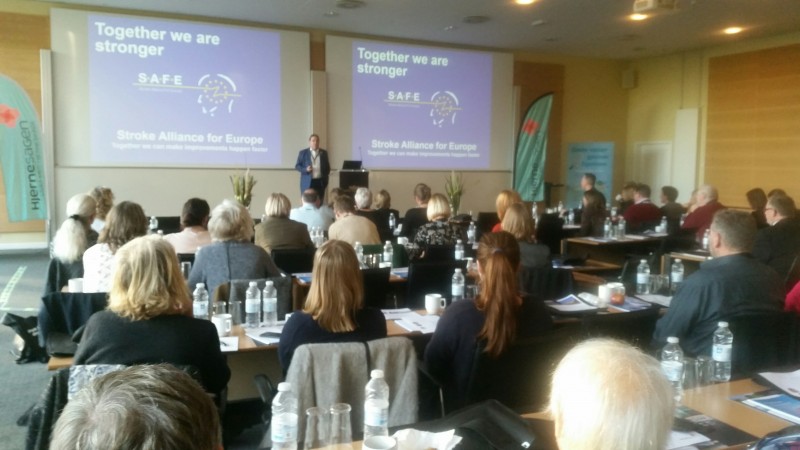
Nov 1, 2017
Research needs to be the platform for action in the decision making and policy sphere- said Jon Barrick, SAFE President at the World Stroke Day event in Denmark, on 30th October 2017.
Please see here the full presentation from this event.

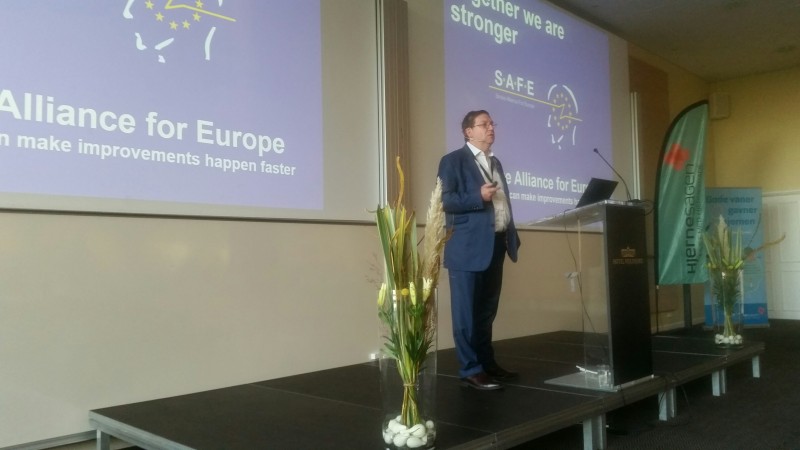
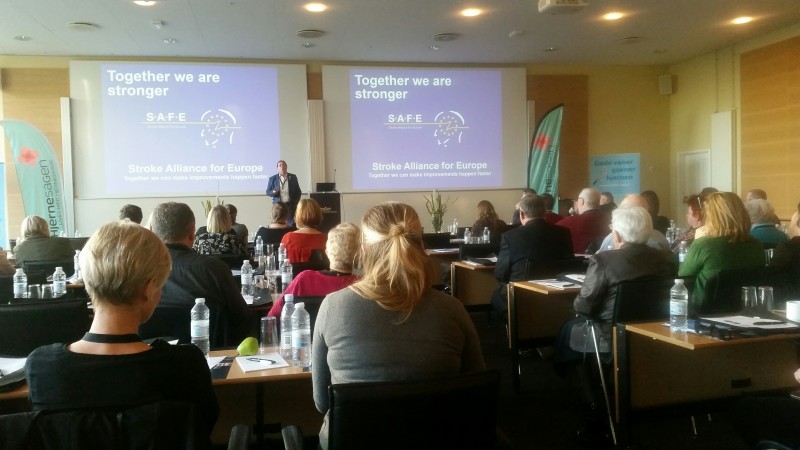
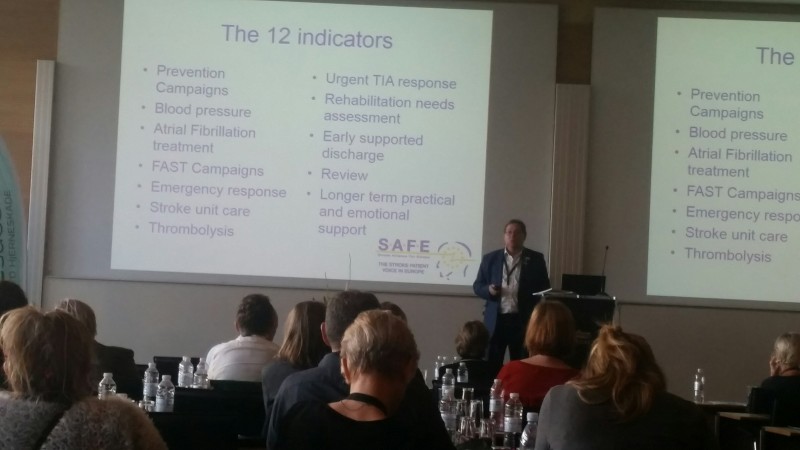
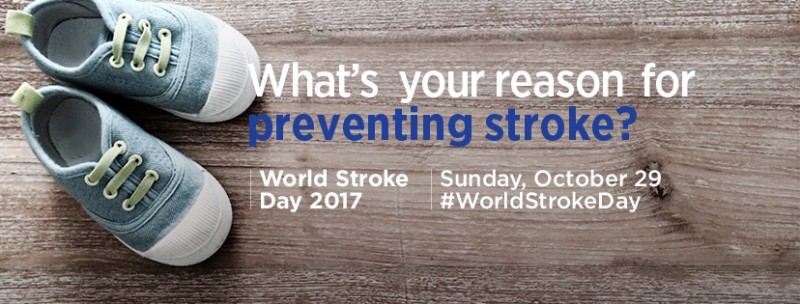
Oct 29, 2017
“WHAT IS YOUR REASON TO PREVENT STROKE?”
“One day we will be able to talk about a stroke and what it used to be and how we had a hand in stopping them.” – Brady Johnson, stroke survivor
Brussels, October 29, 2017: Good news is that stroke is preventable, with ten modifiable risk factors accounting for around 90% of the risk of stroke. Bad news is that we still largely fail to prevent it. On this World Stroke Day, we call upon Governments and health care system decision makers to implement population wide prevention strategies that address the biggest contributors to stroke- said Jon Barrick, SAFE President, adding that healthcare, researchers, stroke survivors and support organisations should all work together on developing and delivering effective national, regional and global stroke prevention strategies and campaigns. (more…)
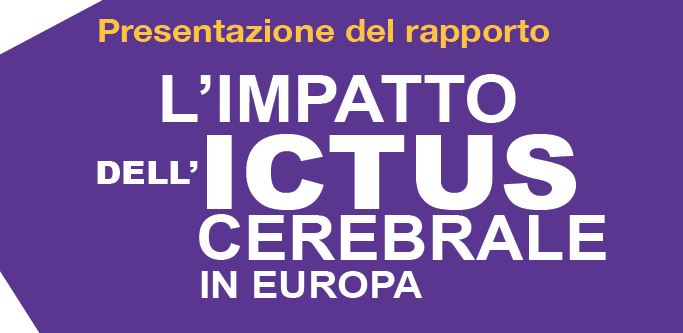
Oct 20, 2017
The Osservatorio Ictus Italia, in collaboration with S.A.F.E. – Stroke Alliance for Europe and with the support of Member of European Parliament, Mr Aldo Patriciello, presented on 17th October 2017 in Rome the Italian translation of the “Burden of Stroke in Europe“, a study done by researchers at King’s College London which presents an in-depth analysis of the state of awareness, information and prevention of this health emergency, care offer, rehabilitation, support and social integration and, in general, the lives of European citizens affected by stroke.

The study, commissioned to researchers at King’s College in London by Stroke Alliance for Europe, looked at data, documents and information from 35 European countries, including Italy, noting significant differences between different care models and disparities in the possibilities of access to therapies. (more…)

Oct 10, 2017
A debate on stroke is emerging in Brussels for the first time, thanks to the joint mobilisation of physicians’ association ESO and the patients’ association Stroke Alliance for Europe – SAFE over the past year. This mobilisation started off with a joint letter sent on November 2016, calling on the European Commission to play a greater role in ensuring access to the current stroke management standards and facilitating cross-border cooperation between member states.
In order to preserve this momentum and garner political support, ESO and MEP Aldo Patriciello have decided to organise an event within the European Parliament, focusing on innovation in stroke treatment and access to it. The primary objective was to bring together representatives from ESO and the EU institutions, physicians and patients with the aim of discussing how to ensure equal access to the current stroke management standards and reduce inequalities within Europe along the whole patient’s care pathway. (more…)
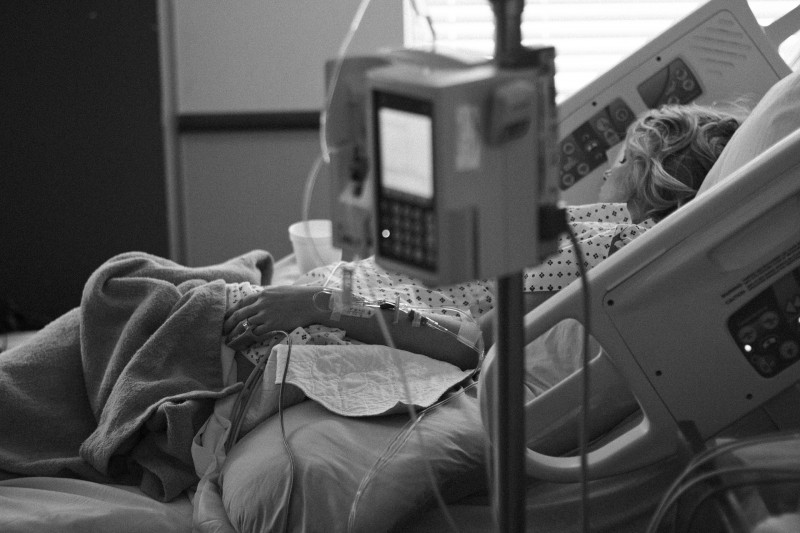
Aug 8, 2017
People who survive a stroke or a mini-stroke without early complications have an increased risk of death, another stroke or heart attack (myocardial infarction) for at least 5 years following the initial stroke, found a new study published in CMAJ (Canadian Medical Association Journal)
“There is a real need to maintain risk reduction strategies, medical support and healthy lifestyle choices over the long-term, even years after a mild initial event,” said senior author Dr. Richard Swartz, a neurologist at Sunnybrook Health Sciences Centre, Toronto, Ontario. (more…)

Jul 22, 2017
NEWS RELEASE
Saturday, July 22nd is World Brain Day. Organisers of the Together Under the Umbrella campaign are inviting the public to share a picture of themselves on the day, using the hashtag #UnderTheUmbrella, to help raise awareness of brain disorders.
Last year’s World Brain Day saw hundreds of pictures shared around the world – selfies, groups of family and friends, medical professionals and patient groups, all stood under umbrellas in support of brain disorder awareness. A wide variety of disease areas were highlighted in these messages including MS, Parkinsons, headache, mental health, chronic pain, ME and rare diseases.
The campaign is an initiative of the European Federation of Neurological Associations (EFNA), who bring together European umbrella organisations of neurological patient advocacy groups.
The umbrella is used as a symbol of unity by the campaign – bringing the many neurological conditions together. To find out more about the campaign visit www.undertheumbrella.eu and follow @UnderUmbrellaEU on social media.
We’re #UnderTheUmbrella for #WorldBrainDay! Join us to raise
#BrainDisorder & #[InsertYourDiseaseArea] awareness
About Together Under the Umbrella
Developed in line with a strategy to advocate for support of patient-led campaigns to educate, eradicate stigma and raise awareness of neurological and chronic pain disorders, Together Under the Umbrella aims:
• To raise awareness of the prevalence of neurological disorders
• To educate society on the range of disorders which are ‘neurological’
• To ‘brand the brain’ by grouping these disorders under a common symbol to create a unified and identifiable
‘brand’
• To provide a platform for European and national patient neurology groups to promote and profile their work
in the areas of advocacy, communications and fundraising using the hashtag #UnderTheUmbrella
About Neurological Disorders
• Each year, approximately 1 in 3 Europeans are affected by a brain disorder and 1 in 5 by chronic pain.
• This includes 153 million people suffering migraine or other disabling headaches, 200 million musculoskeletal
disorders, 100 million people experiencing chronic pain, 8 million living with stroke, 6 million with dementia
and 4 million with traumatic brain injury.
• The World Health Organisation estimates that brain disorders cause one-third of the burden of all diseases.
• €295 billion a year is spent on healthcare for neurological and brain disorders, making them ‘the number one
economic challenge for European health care, now and in the future’.
About the European Federation of Neurological Associations (EFNA):
The European Federation of Neurological Associations (EFNA) brings together European umbrella organisations of neurological patient advocacy groups, to work with other associations in the field of neurology, including the European Academy of Neurology (EAN), in what has been termed a ‘Partnership for Progress’.
EFNA’s aims are:
• To improve the quality of life of people with neurological disorders, their families and carers
• To promote rapid and accurate diagnosis, appropriate treatment, rehabilitation and care for people with
neurological illnesses
• To promote better access to information which is accurate and easy to understand
• To promote public awareness and understanding of neurological conditions
• To eliminate prejudice and stigma associated with neurological disorders
• To increase priority given to neurology by policy and decision makers and by health care providers.
EFNA currently has a membership of 18 associations, based in countries Europe-wide.













